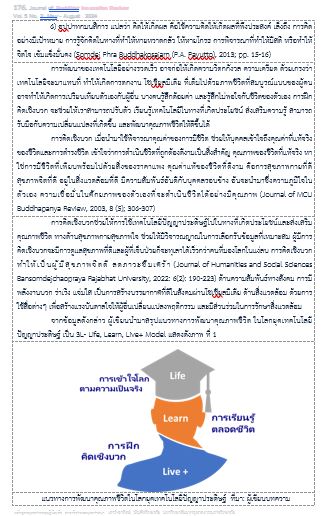Quality of Life Development in the Era of Artificial Intelligence
Main Article Content
Abstract
This academic article aims to present the positive and negative impacts of artificial intelligence (AI) on quality of life and present guidelines for improving the quality of life in line with the world of today. Quality of life development is crucial for adapting to the present world. Awareness of both positive and negative impacts will enable individuals to utilize AI to enhance their own quality of life and that of society. Guidelines for Quality of life development in the AI era include understanding the real world, self-development through lifelong learning, and cultivating positive thinking.
Article Details

This work is licensed under a Creative Commons Attribution-NonCommercial-NoDerivatives 4.0 International License.
เรื่องลิขสิทธิ์/เป็นความคิดเห็นของผู้เขียน
References
Books:
English Martin. (1992). How to Feel Great About Yourself and Your Life: A Step by Step Guide to Positive Thinking. New York: AMACOM.
Mahachulalongkornrajavidyalaya University. (1996). Thai Tripitaka Mahachulalongkorn-rajavidyalaya editio. Bangkok: Mahachulalongkornrajavidyalaya Printing House.
Nipon Poapongsakorn et al. (1992). Impact assessment of central organizations. Bangkok: Kasetsart University.
Phra Brahmagunabhorn (P. A. Payutto). (2007). The Buddhist way of thinking. Bangkok: Dhamma Council.
Potter Alice. (1998). Putting the Positive Thinker to Work: 21 Ways 21 Days to a Happy, Fulfilling, Successful Life. New York: Berkley Books.
Somdej Phra Buddhakosajarn (P.A. Payutto). (2013). Ways of Thinking According to Buddhist Principles. 26th printing. Bangkok: Active Print.
Siri Hamsupho. (2000). Population and quality of life development. Bangkok: Odeon Store. Royal Institute of Thailand. (1999). Dictionary of the Royal Institute of Thailand B.E. 2542. Bangkok: Nanmee Books Publications.
World Health Organization. (1998). The World Health Organization Quality of Life User Manual. Switzerland: Division of Mental health and prevention of substance abuse. World Health Organization.
S Sabitha et.al. (2024). Mind Matters-Power of Positive Thinking. India: Saliha Publications.
Journals:
Busara Niyomves. (2024). Reform Lifelong Learning: Harnessing Technology for Effective Teaching and Learning. Interdisciplinary Academic and Research Journal, 4(1): 380-389. (in Thai)
Hsiao, T., Wenloong, C. and Ying, F. L. (2012). A Study on the Relationship between Thinking Styes (Attitudes) and Collaboration Attitudes of College Students in Taiwan. Journal of Educational and Instructional Studies in the World. 2 (2); 46-57. (in Thai)
Jeerawan Srichanchai and Sujima Tilakarayasrup. (2021). The effect of smartphone usage In early childhood: nursing role. Research Article. Journal of MCU Nakhondhat, 8(10): 115. (in Thai)
Pathomporn Talabhat and Dusdee Suwankajorn. (2017). An Analytical Study of PositiveThinking for Life Development in Buddhist Principle. Research Article. Journal of Graduate Studies Review. 13 (Special Issue): 280-291. (in Thai)
Panjanat Vorawattanachai. (2022). Positive Thinking. Journal of Humanities and Social Sciences Bansomdejchaopraya Rajabhat University. 6 (2): 190-223. (in Thai)
Porntip Gadetragoon. (2023). Buddhist psychology for authentic value of life. Research Article. Journal of MCU Buddhapanya Review. 8 (5): 302-310. (in Thai)
Mongkol Thianprathuangchai. (2022). The analyze the thinking of artificial intelligence (AI) and humans in the concept of Theravada Buddhist philosophy. Research Article. Journal of MCU Nakhondhat. 9 (9): 135-146. (in Thai)
Phramaha Chaiya Chartametho. (2023). An Analytical Study of Lifestyle According to The Sammãditthi (Right View) In Buddhism. Journal of MCU Ubon Review. 8 (2): 1617-1624. (in Thai)
Electronic medias:
Chantama Changsalak. (2023). [Online]. Psychologists warn! Prepare to receive 4 mental health risk factors in the digital world. [Retrieved 28 January 2024]. www.istrong.com.
Bank of Thailand. (2022). [Online]. Entering the era of AI and MACHINE LEARNING, thinking and acting instead of people. [Retrieved 28 January 2024]. www.bot.or.th
Pornpen Sotsrichai. (2023). [Online]. ‘Lifelong learning’: A skill that is essential in a fast-paced world. [Retrieved 28 January 2024]. www.bangkokbiznews.com
IBM. (2024). [Online]. What is Artificial Intelligence (AI)?. [28 January 2024]. www.ibm. Com
National Science and Technology Development Agency (NSTDA). (2023). [Online]. Summary of the seminar 'Life in the modern world and living with AI wisely'. [Retrieved 28 January 2024]. www.nstda.or.th/home/news
Academic conference:
Phusadee Klinkasorn. (2019). Lifelong learning and life skills development. The 14th National and International Academic Conference of Sripathum University.
Foreign language books:
Mackenzie, N. I., Eraut, M., and Jones, H. C. (1970). Teaching and Learning: An Introduction to New Methods and Resources in Higher Education. International Association of Universities. Paris: Unesco.
Maslow, A.H. (1954). Motivation and Personality. New York: Harper Collins.
Peterson, R. E. (1979). Lifelong Learning in America. San Francisco: Jossey-Bass.
The WHO Group. (1994). The Development of the World Health Organization Quality of Life Assessment Instrument. New York: Springer-Verlag.
Dean, H. (1985). Choosing Multiple Instruments to Measure Quality of Life. Oncology Nursing Forum. 2 (2): 88-91.
Ferrans, C.E. & Powers, M.J. (1985). Quality of Life Index: Development and Psychometric Properties. Advances in Nursing Science, 8 (1): 15-24.
Hilgard, E. R. (1962). Impulsive versus realistic thinking: An examination of the distinction between primary and secondary processes in thought. Psychological Bulletin. 59 (6): 477–488.


